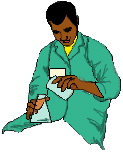

Week 1:Introduction to Medical Anthropology
Reading Assignments:
1. Dancing Skeletons. Read the whole book.
2. Helman: Chapter 1: Introduction: the scope of medical
anthropology. (Pp. 1-10)
Week 2-3: Disease Theories as Cultural Products
WEEK 2:
Topics
Disease as Cultural Products
Cultural systems`as determinants of sickness and healing
Explanatory Models
Political/ Economic theories
Interactionst position
Reading Assignment
1.Helman:
Chapter 5: Doctor-Patient Interactions. (Pp.86-126)
Chapter 7: Pain and Culture. (Pp. 158- 169)
Chapter 2: Cultural definitions of Anatomy and Physiology .
(pp.11-31)
WEEK 3:
Topics
Biomedical Model: Basic Principles
Ecological Perspective
Human Adaptation Model
Reading Assignment
1. Evans, R. G. et al. 1994 Why are Some People Healthy
and Others Not?:
a. Introduction. R.G. Evans (pp. 3-26).
b. Producing Health, Consuming health Care. R.Evans and G. Stoddart.
(Pp27-66).
Week 4: Health and Disease in Human Evolution
Topics
Human evolution and disease
Human Adaptation to disease
Natural Selection and Disease
Epidemiological Transition Theory
Reading Assignments
1. Huss-Ashmore:
a. Introduction: Health and Lifestyle Transition. Huss-Ashmore, R.
(Pp. 7-12)
b.Behavioral Change and the Evolution of Human Host-pathogen Systems.
McGrath, J. (Pp.13-22)
c. Preindustrial Urban Lifestyle and Health. Storey, R. (Pp.
33-42)
d. From Blackstrap Molasses to Smokeless Tobacco: Achronicle of
Assults on the Dental Health of
Native American of the Northwest. Hall, R.L. (Pp43-50)
e. Health, Economic Change, and regional Political Economic
Relations: Example From
Prehistory. Goodman, A. Et al. (Pp 51-60)
Weeks 5-7: Current Problems and Issues-Who Becomes Sick,
Injured or Dies?
WEEK 5-6:
Topics
Epidemiological Transition Theory
If not genetics what else?
The influence of ethnicity, class and gender
Degenerative diseases: CHD, Diabetes
Reading Assignments
1. Cooper, R. S. 1991 Celebrate diversity - or should we?
Ethnicity and Disease. 1 (1): 3-7.
2. Kumanyika, S. and P. Golden 1991 Cross-sectional difference in
health status in US racial/ethni
minority groups:Potential influence of temporal changes, disease and
lifestyle transitions.
Ethnicity and Disease 1(1):50-59.
3. Barker, J. 1992 Cultural Diversity - Changing the Context of
Medical Practice. West. J. Med.
157: 248-254.
4. Crews, D.E. and G.D. James. 1991 Human evolution and the genetic
epidemiology of chronic
degenerative diseases. In Applications of Biological
Anthropology To Human Affairs. Pp. 185-206.
C.G.N. Mascie-Taylor and G.W. Lasker (eds). Cambridge University
Press: Cambridge, UK.
5. Helman, C. Culture, health and Illness.
a. Chapter 12. Cultural factors in Epidemiology. (Pp
267-249).
WEEK 7:
Topics
Women's health, sickness and illness
Medicalization of the reproductive cycle
Menstruation, Pregnancy, Birth, Menopause
Stress and Culture Change
Reading Assignments
1. Helman, C. Culture, Health and Illness.
a. Chapter 6: Gender and Reproduction. (Pp 127-157)
b. Chapter 11: Cultural Aspects of Stress. (Pp. 249-266).
c. Chapter 3: Diet and Nutrition (pp31-53).
2. Huss-Ashmore, R., et. al. Health and Lifestyle Change.
a. Social Status and Growth: Theoretical and Methodological
Considerations. J. Bindon. (Pp. 61-70)
b. Variability in Adaptive Responses to Dietary Change among Andean
Farmers. W. Leonard.
(Pp 71-83)
c. Illness and Lifestyle Change. T. Leatherman (pp 83-89)
d. Fat Patterns and Blood Pressure among the Manus of Paupa New
Guinea: A Migrant Study.
J. Schall. (Pp 90-104)
e. Lifestyle Change and Fertility Transition for Southeast Asian
Refugees: Focus on the Lao.
J. Brainard and A. Zaharlick. (Pp115-123)
Week 9-10: Healing Systems
Topics:
Healing systems
Seeking health and help
Reading Assignments:
1. Helman, C. Culture, health and Illness.
a. Chapter 4. Caring, and Curing: Sectors of Health Care (pp
54-85).
b. Chapter 9: Ritual and the management of Misfortune (pp. 192
-213)
c. Chapter 10: Cross-cultural Psychiatry (pp214-248).